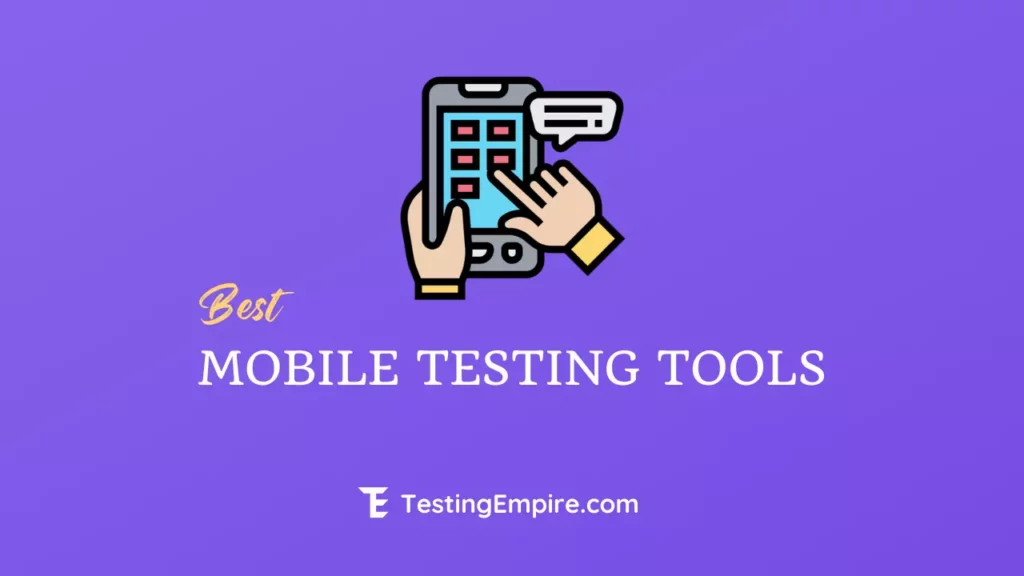
As technology advances and more people are using their smartphones as a primary source of information, it’s important that these devices work properly. Software testers are often tasked with testing new features on different devices. Mobile apps have become an integral part of our lives so having the right tools can make testers life much easier – or at least less frustrating!
Here are some of the best mobile testing tools out there for both Android and iOS devices.
What is a Mobile Testing Tool?
Mobile testing tools can be used to test mobile applications. It helps us to verify and validate the usability, functionality, security, and consistency of the mobile application. With the exponential increase of mobile users came many mobile applications which created this need for testing mobile applications in a fast and efficient manner.
Mobile testing tools can help the organization to test various types of mobile applications like native, web and hybrid. There are options to run the test in simulators, emulators and even in real devices. But the usage of these tools is entirely subjective to the requirement of the organization.
Why Mobile Testing Tool is important?
- It helps us satisfy the major source of users of the application, mobile users.
- With high-quality mobile applications, you can stay competitive in the market.
- To enhance the user experience by giving them good usability and performance in the application.
- It helps us to avoid security threats and data leaks in the application.
- It automates tedious tasks and helps with releasing the software quicker.
- It checks the behaviour of the application under the impact of interruptions and network fluctuations.
How to choose a Mobile Testing Tool?
The primary goal of the mobile testing tool is to check the compatibility of the application while testing it on both Android and iOS. Mobile testing tools should support multiple scripting languages and mobile platforms to obtain the maximum benefit out of the process.
To choose the right mobile testing tools, you have to first know what needs to be automated in your application. Then you can research different products in the market that meet your needs. You have the option of pilot testing the tool by trying the free trial version and then you can make a clear decision.
- It should support multiple programming languages.
- It should meet current and future testing need with its features, abilities and ease of use
- It should have the ability to support report generation.
- It should allow us to create different tests for various OS.
- It should also have a scriptless option for creating tests.
- It should seamlessly integrate with the CD/CI applications.
- It should be flexible, scalable and adaptable to the current trends of the industry.
- It should provide cross-browser and cross-platform support.
- It should have the ability to reuse the testing scripts to save time.
- It should integrate with other parts of the system like test management tools, application lifecycle management, and help in communicating with all stakeholders.
What are the advantages of a Mobile Testing Tool?
- It provides the application with end to end security.
- It supports the scalability of the application through load testing, stress testing and more.
- It can schedule a test run any time of the day and let it run without much effort from the resource.
- It reduces the overall testing time of the application being tested when compared to manual testing.
- It can run on multiple devices simultaneously, thus reducing the time being tested.
List of Best Mobile Testing Tools
#1. Appium
Best for automation of native, mobile, and web as well as hybrid apps on iOS and Android platforms.

Appium is the most popular mobile app testing tool that professional testers use. It’s an open-source framework for automated testing that allows you to create UI tests for mobile web, native, and hybrid apps. It supports code reuse across iOS and Android test suites and covers both iOS and Android mobile platforms. There is no need to modify any app code for testing purposes as it is suitable to run on Android or iOS using the device or emulator.
Features:
- This mobile automation testing tool supports many programming languages, such as Java, Ruby, C#, and others which are in the WebDriver library.
- It utilizes WebDriver interface for tests running.
- It is used for Automated Functional Testing of Android and iOS mobile apps.
- Integrates with Jenkins and other CI/CD tools.
#2. Ranorex Studio

Best for beginners as well as automation experts.
Ranorex Studio is an automation application made for multiple testing purposes. More than 4000 companies use this tool as a suitable solution to mobile app testing. This tool is ideal for those who are just starting to learn about mobile app testing. It can be used with both Android and iOS mobile apps testing, as well as web and native applications.
Features:
- Ranorex Studio provides powerful object recognition capabilities that eliminate device fragmentation.
- This tool improves test efficiency by allowing native and cross-browser testing.
- It also allows you to reuse your tests across different testing platforms.
- Support for WinForms and WPF when running on Net core 3.0.
- It integrates seamlessly with other tools like TestRail and Jenkin, Travis CI (CI), Jira, etc.
#3. Kobiton

Best for real devices to run manual and automated tests on native, web, and hybrid Android/iOS apps.
Kobiton is a robust mobile application testing platform that allows organizations to manage the devices they own and access real public cloud devices for more efficient, comprehensive test coverage. Kobiton is simple to use, flexible, and accessible from any location. It helps companies minimize costs while increasing productivity so businesses can get apps to market sooner.
Features:
- Test on hundreds of real devices you want and when you need them.
- Device lab management – Manage a full lab that includes local on-premise devices, private cloud, and public cloud.
- It gives users full control of real mobile devices during manual testing with support for multi-touch gestures, orientation and GPS simulations, camera and speaker control, and device connection management.
- Automatically create test scripts using manual test sessions that are converted into Appium scripts. These scripts can then be executed on iOS and Android devices.
#4. TestComplete

Best for running UI tests on real mobile devices, virtual machines, or emulators.
TestComplete by SmartBear’s is another great automated UI testing tool. It allows you to create, maintain, and execute UI tests for mobile, desktop, and web applications. TestComplete can test both native and hybrid mobile applications. It can run tests on emulators as well as real devices and virtual machines. It offers both script- and scriptless options for test creation.
Features:
- This tool supports common programming languages like C#, C++, and JavaScript.
- Easily integrates to popular CI/CD tools such as Git, Jenkins, Jira, and Git.
- With this tool, you can create and run repeatable and robust UI tests across native or hybrid mobile apps.
- Converts both recorded GUI tests and keyword-driven test scripts into the supported scripting languages.
#5. EggPlant

Best for UI Automation and functional, Image-Based Testing, Mobile Testing, Network Testing, Web Testing, and Cross-Browser Testing.
Eggplant is an industry-leading GUI Automation Testing platform designed and developed by TestPlant, used for Android and iOS app testing. It uses AI and machine learning to automate mobile testing and help teams in regulated environments deliver DevOps at scale. Because it supports multiple testing platforms, including Android, iOS, and BlackBerry, as well as the older Windows Phone and Symbian, its mobile testing solution is highly favored.
Features:
- EggPlant uses AI technology to ensure continuity of remote work on Cloud.
- Eggplant can test any technology on any device, OS, or browser, from the UI to APIs to the database. This incorporates everything from the most modern, highly dynamic website to legacy back-office systems and Command and Control systems.
- Test business applications as businesses modernize and move into the Cloud for remote working.
#6. Xamarin.UITest

Best for running UI Acceptance Tests on iOS and Android apps.
As the name suggests, the Xamarin.UITest is one of a kind framework that works only for testing the UI acceptance over iOS or Android apps. It is the best testing tool for Android, iOS, and native applications. It is based on a testing framework called Calabash, written in Ruby.
Features:
- This tool supports cross-platform testing measures, and the test scripts are written in C#.
- Also, it integrates well with most of the Visual Studio Products and Microsoft.
- It supports cross-platform testing.
#7. Applitools

Best for visual and functional testing.
Applitools offers Visual Application Management and AI-powered visual UI testing and monitoring for mobile and web applications. Its AI-powered end-to-end platform, Applitools Eyes, allows developers and QA to monitor and continuously test every aspect of an app before, during, and after any code change. All aspects of the app can be tested simultaneously and immediately.
Features:
- It is easy for teams to quickly create, fix, and analyze test results. They can pinpoint the exact lines of code that caused the bug.
- With its Ultrafast Grid feature, you run your functional & visual tests locally, and the grid instantly renders all screens across every combination of browsers, devices, and viewports.
- You can leverage over 50 SDKs to insert Visual AI-powered assertions into your existing test code.
#8. Tricentis Tosca

Best for continuous automated testing.
Tricentis Tosca is another excellent mobile app testing platform. It optimizes and accelerates end-to-end testing of your entire digital landscape. It supports over 160+ technologies and enterprise apps, ensuring your test automation scales across the enterprise.
Features:
- It supports Agile, DevOps, and Waterfall workflows to guide transformation across the enterprise. It also supports performance testing through its integration with NeoLoad.
- Tosca covers every level of testing, from API testing, exploratory testing, mobile testing to system integration testing and regression testing.
- It let users build codeless, resilient, automated tests with a unique approach that separates the automation model from the underlying application.
- Its risk-based test optimization lets users prioritize business-critical functionality testing, decreases overall test creation and maintenance costs, and takes smart “go/no-go” release decisions.
#9. Robotium

Best for testing apps on Android.
Robotium is an android testing tool to automate test cases for native as well as hybrid apps. With this tool, you can create a strong automatic GUI testing case for Android applications. This tool makes it easy to write powerful and robust automatic black-box UI tests for Android applications.
Features:
- It can handle multiple Android activities automatically.
- You can test Android apps, both native and hybrid.
- It integrates smoothly with Maven, Gradle, or Ant to run tests as part of continuous integration.
#10. Espresso
Best for running Android-specific UI test automation.
Espresso is one of the most widely used mobile testing frameworks. Created by Google and integrated with Android Studio, this tool is well-known to anyone who develops native Android applications. Similar to TestComplete, Espresso allows you to create Android UI tests. The tool can handle automatic syncing of apps and tests; most developers find this tool effective because of its simple API and scope for flexibility.
Features:
- It is a development-friendly solution to create unit and functional tests directly from the Android Studio IDE.
- It is embedded into the Android IDE, which is the de-facto development environment for Android native and hybrid apps. In addition, executing Espresso Android automation is fast due to its unique architecture.
- It makes synchronization between test steps simple, making the execution reliable and fast on both virtual emulators and real devices.
#11. XCUI Test
Best for iOs app testing.
Apple created XCUITest only for iOS app UI testing. XCUITest runs in the Xcode IDE. It allows you to write tests within it. This is especially useful for iOS developers. The framework can also be used in conjunction with Xcode’s UI testing recording tools. Because of its unique architecture, it enables faster test execution. You can also speed up your tests by running them in parallel across devices.
Features:
- It is a comprehensive framework for automated UI testing of iOS apps.
- This tool supports a broad range of tests for macOS environments.
- It accelerates feedback as teams can work on the app’s source code as well as test code in one place.
- Enables developers to monitor the internals of the device for finer control.
#12. SeeTest
Best for running continuous web and mobile app testing for iOS, Android, Blackberry and Windows Phone.
SeeTest is one of the leading mobile app testing tools in the industry that supports both Image-Based and Object-Based recognition. Additionally, it supports automation of iOS, Android, Windows Phone, and BlackBerry apps.
Features:
- Integrate with industry open-source tools like Appium and Selenium.
- It offers client libraries for Java, C#, Perl, Python to develop automation scripts in these programming languages.
- It provides reporting mechanism that can contain screenshots and video recordings of tests performed.
Conclusion
Choosing the right mobile testing tool is essential for any business that wants to maintain a competitive edge. With so many different options available, it can be difficult to know which one will best suit your needs and budget. This blog post has discussed the importance of best mobile testing tools as well as how they work and what features you should look out for when choosing a new solution. We hope this information helps make your decision process easier!
Research Process
Total tools reviewed: 16
Total tools finalized: 12
Total time spent: 96 hrs
Related posts:
